-
Car Reviews
- All reviews
- Midsize SUVs
- Small cars
- Utes
- Small SUVs
- Large SUVs
- Large cars
- Sports SUVs
- Sports cars
- Vans
Latest reviews
- Car News
-
Car Comparisons
Latest comparisons
- Chasing Deals
Newly-available diesel power feels right at home in the Genesis G80 limo – don’t let the four-cylinder count put you off

When the second-generation Genesis G80 launched in Australia last year, buyers could select from two punchy petrol engines.
The base 2.5-litre turbo four, with 224kW of power and 422Nm, was adequate, while the adaptively-damped flagship variant, with its 3.5-litre twin-turbo V6 making 279kW/530Nm, was downright frenetic.
Except that the G80 is philosophically the opposite of frenetic. The twin-turbo V6 petrol might entertain with its almost comical surge of torque and the clear rear bias of its AWD system, but its limits are so high you start to trouble the G80’s … relaxed chassis.
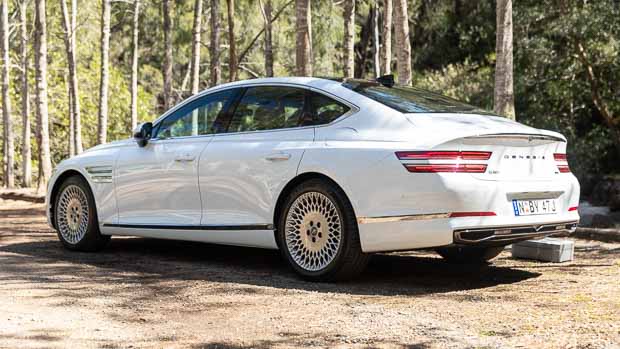
It turns out what this car needed was a long-legged and effortless diesel. Now that the G80 has an oiler, this limo finally feels like it has the right engine for Australia.
You might have been hoping for the three-litre inline-six diesel that GV80 SUV buyers can score, but that wasn’t possible. Instead, the G80 sedan is fitted with the Hyundai Group’s 2.2-litre four-cylinder turbo diesel making 154kW of power and 442Nm of torque.
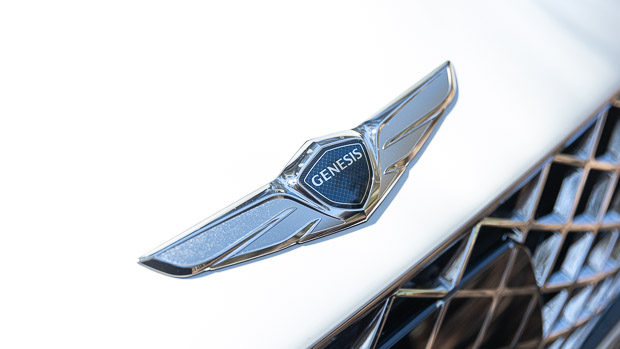
Our tester was also specified with the $13,000 Luxury Package, bringing the total spend to $100,271.
In our video review, I explained that I felt the G80 diesel was “70 percent as good as the new Mercedes-Benz S-Class for one-third of the price” – key to that vibe is the sheer level of opulence the Luxury Package adds to the vehicle.
Don’t let the lower cylinder count put you off: a suite of updates to bring the 2.2 up to “Smartstream-D” spec – including an aluminium block – plus extensive sound deadening makes this engine more than enough to pull the G80.
In fact, the G80 diesel is so quiet and muscular that its performance can sneak up on you – but it’s delivered in such a serene way that you simply make progress in an unimpeded, efficient manner.
This engine may do service in the new Kia Sorento and Hyundai Santa Fe, but it feels entirely up to the job of motivating the G80 – even if we still harbour plenty of affection for the silky six-pot diesel in the GV80 we ran as a long-termer for a time. Still, the 2.2 runs longitudinally here, sending torque to the rear wheels through a nearly-imperceptible eight-speed torque converter automatic transmission.
Private buyers in particular might miss the sprightly 6.0sec 0-100km/h time of the four-cylinder petrol, which falls to 5.1sec in the downright athletic 3.5-litre V6. By contrast, the diesel takes a more leisurely 8.0sec over the benchmark sprint.
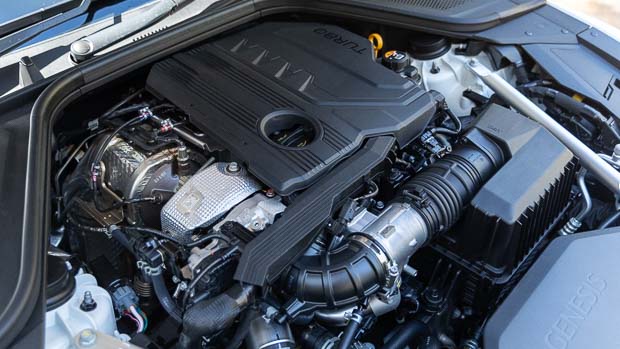
That would be to miss the point of the G80 entirely, though. This large, near two-tonne sedan doesn’t encourage you to floor it at every green light or to antagonise other motorists. The Genesis responds better to being driven gracefully, tapping into low- and mid-range torque to waft up to freeway speeds and beyond with elegance.
That characteristic is well-served by the muscular diesel, and it’s telling that across a 400m sprint the unrelenting diesel begins to reel in the turbo petrol four-cylinder, with the 2.0sec deficit to 100km/h whittled down to 1.5sec as the 400m camera flashes.
Running on 19-inch wheels, the G80 diesel has an almost refreshingly simple approach to suspension: there is posh multi-link suspension front and rear but the dampers are fixed.
Only by upgrading to the 3.5-litre twin-turbo grade with 20-inch wheels do you gain an adaptive suspension, but it needs it – as the twenties are wrapped in very low-profile 245/40 front and 275/35 rear tyres.
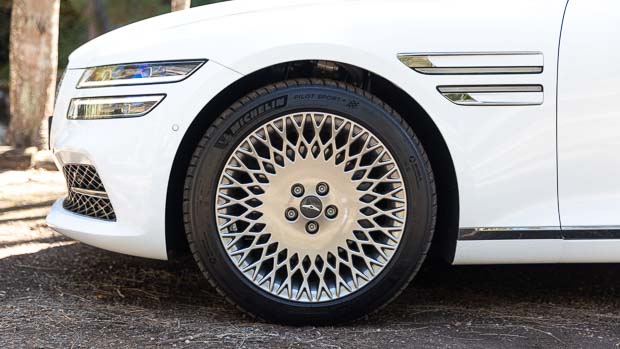
The more sensible 19s have a rather delicate lace design that some of our staff loved and others hated, but everybody liked the cushioning effect of the somewhat chunkier 275/45 rear and 275/40 front tyres.
Urban potholes and imperfections are ironed out well by the Michelins – which are still sticky Pilot Sport 4-spec – while the “high performance dampers” are well-tuned to smoothing the vicissitudes of Sydney’s chopped pavement.
An occasional thump will land in the cabin from the worst stuff but on the whole, the ride quality is excellent.
There is a gentle but noticeable bobbing from the rear suspension, however. You notice it in town (where it doesn’t bother), but as the pace builds – especially on country B-roads – the effect becomes quite pronounced. You’d generously call the body control relaxed.
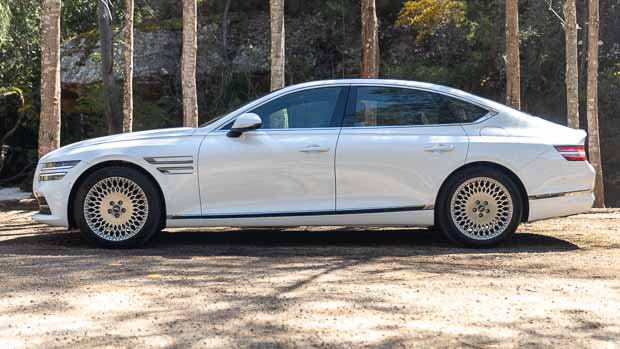
Start to approach the limits of the G80’s aggressive tyres in the corners and the chassis is no longer really with you – if that’s the way you like to drive your luxo-barge, we’d recommend the BMW 520d.
That said, the G80’s light steering is accurate and easy and there’s a dignified view out over the sculpted bonnet from the driver’s seat.
Shaped like a rugby ball, the steering wheel is pleasantly thin-rimmed and offers quick access to the car’s adaptive safety systems – including a deactivation for the (well-tuned and accurate) lane centring system.
The adaptive cruise control works smoothly, while the G80’s blind spot cameras sit among the best systems we’ve used for seeing what’s behind you and to your side.
Like other Genesis vehicles, though, you must specify the Luxury Package ($13,000) if you want to fit reversing AEB. Given the narrow aperture of the rear glass, that’s a must. Forwards AEB, with car, pedestrian and cyclist detection, is standard, as is junction AEB.
As standard, the Genesis G80 has a ‘nice’ interior with plenty of leather.
But who wants nice when for $13,000 – okay, that’s 15 percent of the price of the car! – you can add the Luxury Package, which catapults the G80 from the realm of the tidy to the truly opulent.
The specification guide to the car exhaustively lists 40 additional refinements the Luxury Package brings to the fore and nearly every one of them are features we’d consider worthwhile.
That starts with nappa leather – nappa everywhere. The seats take on the soft hide in an attractive – though not overstated – quilted pattern and there is a choice of attractive interior colour-ways.
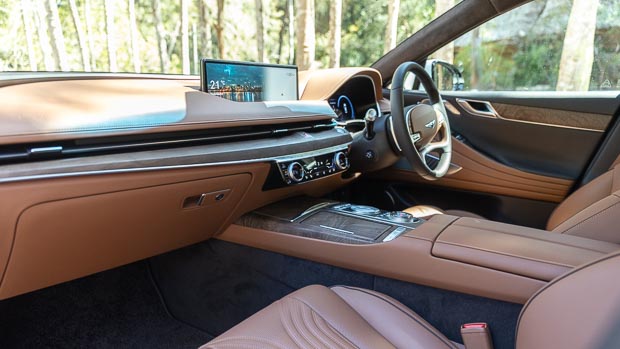
Our tester’s two-tone cabin, blending Havana brown seats with maroon brown headlining and secondary trim beneath glistening, deep Uyuni white mica paint, came up well. The driver’s seat is upgraded in Luxury guise to an 18-way adjustable unit with tightening side bolsters, a thigh extender and three massage programs.
So why is the front passenger left out in the cold? That might be a little dramatic, but your Number 2 sitting next to you misses out on the lateral and thigh adjustments, massage, and even memory. We chalk this up to an oversight rather than Genesis nickel-diming – but it needs to be addressed.
A range of blues, reds and greens can spice up the exterior. Inside, our car’s tanned aesthetic can be substituted for black, vanilla beige, dune beige or an enticing forest blue.
All cars get beautiful, genuine open-pore wood trim that, as you’d expect for natural products, vary from panel to panel and from car to car. Printed veneer this is not. Seat heaters and coolers up front are included gratis, too.
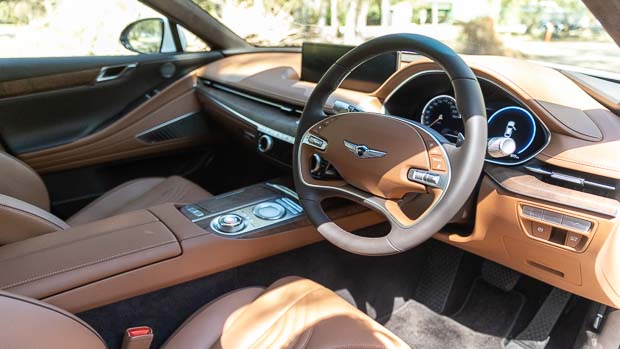
But back to the nappa leather: it also covers the centre console and the dash, while the airbag cover on the puck-shaped steering wheel is stitched leather too.
Don’t bother looking around your feet for hard, scratchy stuff, either. Even the kick surfaces by the speaker and door bin are covered in yielding materials. Lush. Above you? Suede headlining.
To complement the standard 14.5-inch superwide touchscreen that must be seen to be believed, the Luxury Package also adds a 12.3-inch digital instrument cluster that finishes off the tech tidily. This ought to be standard, as it is on a $50,000 Hyundai Tucson (admittedly in 10-inch form).
All G80 buyers get a 12-inch head-up display and a brilliant 21-speaker Lexicon by Harman stereo with 1050 watts of power, Quantum Logic surround sound and digital signal processing. Clear, crisp, loud and warm, the audio quality is excellent.
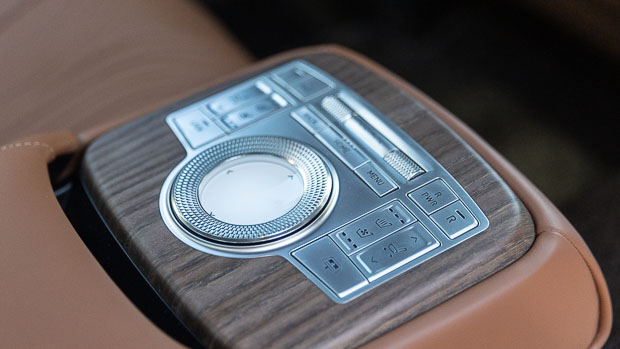
But you’ll be using a USB cable or Bluetooth, as there is no wireless Apple CarPlay or Android Auto, despite this becoming de rigeur at this price point, being standard on both the Audi A6 and BMW 5 Series.
Perhaps the Luxury Package is most beneficial for buyers who will regularly use the second row, which it transforms into a plush business-class cabin with twin reclining seats and dual 9.2-inch HD touchscreens.
Outboard passengers can enjoy their own audio or video by USB port and there are twin 3.5mm jacks for headphones. Seat heating and cooling is also added to the second row.
Toe room for rear passengers is a little restricted if the front occupants have their seats at their lowest height, but rear headroom and legroom is excellent.
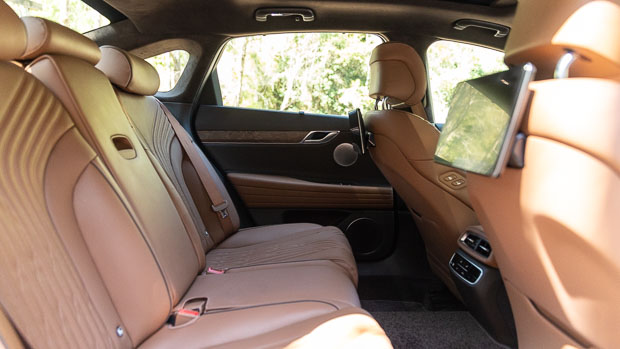
But while there is a power blind, back seat occupants have to do their individual side window sun blinds manually. No big deal, but this function is automatic in the GV80 SUV.
Behind a power tailgate sits the G80 sedan’s 424-litre boot. It’s a decently long space but the aperture to access it is narrow and we only managed to fit one set of suitcases. There’s a space-saver spare wheel beneath the boot floor, however.
While the G80’s 2.2-litre diesel engine is not as frugal as four-cylinder diesels offered in German rivals, it’s still by far the most economical engine in the G80 lineup – and 8L/100km feels like a good result when whisking 1.9 tonnes plus load about the city.
We biased town running in our test as we imagine the G80 will be quite popular as a luxurious sedan for private hire car customers.
Against the Genesis claim of 6.6L/100km for combined driving and 8.9L/100km for town running, we’re satisfied.
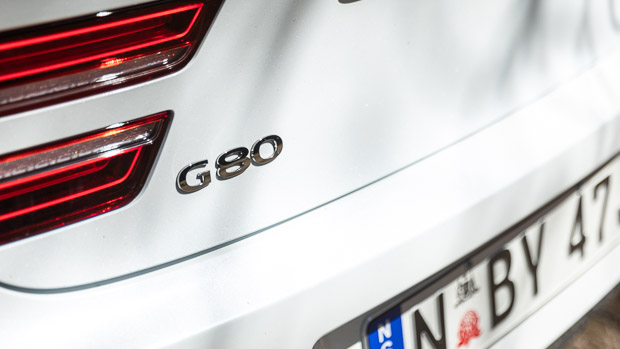
Servicing is complimentary on the Genesis G80 for the first five services. The mileage interval between maintenance is 15,000km for the diesel engine.
For drivers expecting to do very significant mileage it is worth noting that the Mercedes-Benz E-Class can travel for 25,000km between scheduled annual services.
The Genesis warranty differentiates between commercial and private customers.
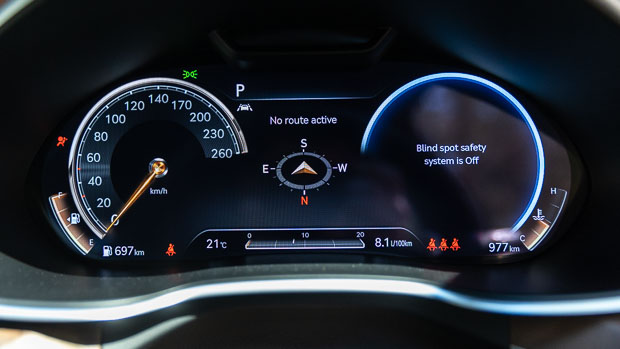
Given the G80 diesel’s suitability for private hire car use, this is highly relevant. For commercial users, the warranty is 5 years/130,000km – allowing 26,000km on average per year.
For private users, though, all Genesis vehicles have a five year, unlimited kilometre warranty arrangement.
This split reflects a change in attitude since Hyundai shifted the G80 across to its own brand. When the first-generation iteration of this vehicle was badged as the Hyundai Genesis, there was a specific exclusion to the shorter commercial warranty for chauffeur or hire car businesses – no longer.
For the price of a relatively barebones BMW 5 Series or Mercedes-Benz E-Class, the $100,000 Genesis G80 diesel with the optional Luxury Package provides opulence that is nearly equal to an S-Class or 7 Series.
That is a tried and true method for establishing a name in the luxury space: Lexus did the same with the LS 400 in the early 1990s.
Buyer preferences for SUVs means the characteristics of the luxury market have shifted quite considerably since the LS 400 pulled this trick, but it doesn’t change the fact that the G80 diesel offers an enormous amount of car for a hundred thousand bucks.
It’s quiet, effortless and beautifully appointed, and it’s simply the case that you’d need to spend 30 to 50 percent more to match the G80’s specification with a German rival.
In the case of Lexus, the removal of the GS sedan from the lineup means that, over there, you’d have to consider the $200,000 LS.
For those needing to travel great distances or carry people in comfort, the G80 diesel leaves a lasting, positive impression.
Key specs (as tested)
About Chasing cars
Chasing Cars reviews are 100% independent.
Because we are powered by Budget Direct Insurance, we don’t receive advertising or sales revenue from car manufacturers.
We’re truly independent – giving you Australia’s best car reviews.
The estimate provided does not take into account your personal circumstances but is intended to give a general indication of the cost of insurance, in order to obtain a complete quote, please visit www.budgetdirect.com.au. Estimate includes 15%^ online discount.
^Conditions Apply
Budget Direct Insurance arranged by Auto & General Services Pty Ltd ACN 003 617 909(AGS) AFSL 241 411, for and on behalf of the insurer, Auto & General Insurance Company Limited(ABN 42 111 586 353, AFSL 285 571).Because we don’t know your financial needs, we can’t advise you if this insurance will suit you. You should consider your needs and the Product Disclosure Statement before making a decision to buy insurance. Terms and conditions apply.
Indicative quote based on assumptions including postcode , 40 year old male with no offences, licence suspensions or claims in the last 5 years, a NCD Rating 1 and no younger drivers listed. White car, driven up to 10,000kms a year, unfinanced, with no modifications, factory options and/or non-standard accessories, private use only and garaged at night.
^Online Discounts Terms & Conditions
1. Discounts apply to the premium paid for a new Budget Direct Gold Comprehensive Car Insurance, Third Party Property Only or Third Party Property, Fire & Theft Insurance policy initiated online on or after 29 March 2017. Discounts do not apply to optional Roadside Assistance.
2. Discounts do not apply to any renewal offer of insurance.
3. Discounts only apply to the insurance portion of the premium. Discounts are applied before government charges, taxes, levies and fees, including instalment processing fees (as applicable). The full extent of discounts may therefore be impacted.
4. We reserve the right to change the offer without notice.